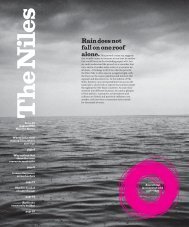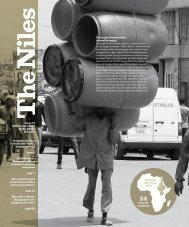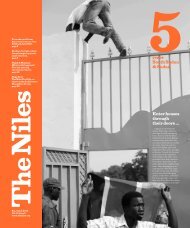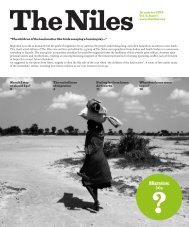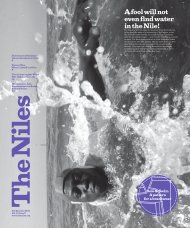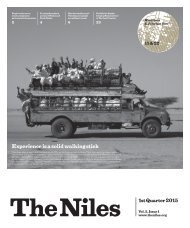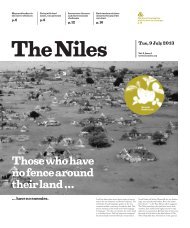When deeds speak, words are nothing
Speaking about sustainable development is easy. Acting sustainably is another matter. And now the evidence is unequivocal: Mankind’s impact on nature is causing the climate to change rapidly and drastically, threatening the environment and the very resources we need to survive. Aware that humanity is careening close to the edge, The Niles correspondents set out to explore where and how people in the Nile Basin region rethink. So much of their findings for now: We are an endlessly innovative species. Cooperation is our superpower. When deeds speak, words are nothing.
Speaking about sustainable development is easy. Acting sustainably is another matter. And now the evidence is unequivocal: Mankind’s impact on nature is causing the climate to change rapidly and drastically, threatening the environment and the very resources we need to survive. Aware that humanity is careening close to the edge, The Niles correspondents set out to explore where and how people in the Nile Basin region rethink. So much of their findings for now: We are an endlessly innovative species. Cooperation is our superpower. When deeds speak, words are nothing.
You also want an ePaper? Increase the reach of your titles
YUMPU automatically turns print PDFs into web optimized ePapers that Google loves.
Tuti Island
farming:
Survival
of the
wealthiest
Beneath the beauty of Tuti Island
lurks a harsh reality for local
farmers, who are seeing their harvests
deteriorate.
re<think
34
the way we eat
I
n the centre of Khartoum State, tourists flock to
Tuti Island, known for its sandy beaches, natural
landscapes, and impressive sunrises. However,
despite its idyllic location, its fertile lands and
an endless supply of water, many farmers on
the island are struggling to survive. Lacking
knowledge of modern techniques while facing
governmental neglect and a temperamental
river, the odds are stacked against the less fortunate
who try to cultivate crops on the island.
“We still do traditional farming, same as
always, and no experts or representatives from
the ministry of agriculture come to direct us.
We want to learn new ways of cultivation, what
type of crops are best for our land and other
information that could help us maximise our
production,” says Mahmoud Yasin, an old
farmer living and working on the Tuti Island.
Another farmer, Elhadi Abdul Wahab, says
that he has cultivated the same crops every
season for years with very little profit. “We have
many questions that remained unanswered,
like the late timing of the rains, the huge amount
of sand that came with the floods, and the
unexpectedly low production. No official
addressed those issues.”
Agricultural engineer Abeer Ali also pointed
the finger at the government. “The governmental
entity responsible is Agricultural Guidance,
but they are not doing their job. They don’t even
keep up with the latest agricultural tech. Only
the big-scale private sector projects are using
modern technology, starting from choosing the
right type of crops to the methods of irrigation
and cultivation.”









